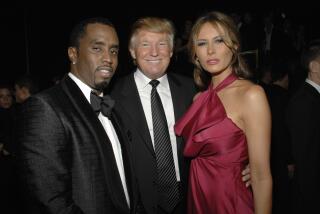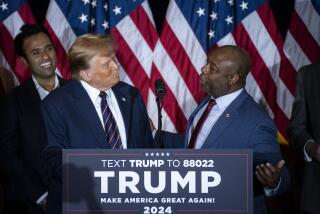Obama’s slave link
There’s a new twist in the ongoing story line of our post-historical racial age allegedly represented by Barack Obama.
Last week, genealogists at Ancestry.com announced the strong likelihood that Obama is a descendant — the 11th great-grandson, to be exact — of John Punch, who in 1640 became the first black person to be legally defined as a slave. This lineage comes not through Obama’s African father but through his white mother, Stanley Ann Dunham, who is apparently descended from children Punch had with a white woman.
The researcher’s conclusions are not ironclad. But even if Obama turns out not to be related to Punch — which is highly unlikely — researchers have established beyond doubt that Dunham’s family has black ancestry that almost certainly can be traced back to American slaves. Which means that Obama is more black than we imagined. A familiar kind of black.
The slaves-in-the-family revelation isn’t in itself shocking — lots of white Americans would find this out if they went digging. But for Obama, it shifts, or maybe even cracks, one part of the personal mystique that propelled him to the White House. Remember when he was hailed as a new kind of black man, a racial bridge builder almost by dint of genetics, because his mother was a white Kansan and his father a black Kenyan?
Mixed parentage is nothing new, but Obama was unique in that he seemed to bypass the common black American experience of slavery and miscegenation that was responsible for the majority of American black folks who look like him. That was politically important because it meant Obama was, for the majority of white voters, a guilt-free black man. His existence wasn’t a reprimand, a reminder of slavery and inequality and all those burdensome things associated with “regular” black people and black names like Washington or Jackson or even Robinson, the maiden name of Obama’s wife, Michelle.
Obama didn’t get a pass, exactly, but his background was a big part of the public fascination that lifted him just high enough above the fray to allow him to succeed. At the height of his popularity he seemed to offer a clean slate, a new black reality arriving in the White House as official affirmation of the possibility of a post-racial age.
But it turns out that not only is Obama not post-black, he’s tied to a seminal moment in the long and sordid history of institutionalized racism in America, the effects of which we’re still living with. One of those is a racially skewed criminal justice system that has its roots in Punch’s story: An indentured servant who escaped from his master along with two fellow indentured servants who were white, Punch alone received a harsh life sentence of slavery.
The revelation raises issues that are bound to make Americans of all political stripes uneasy. The president’s history no longer is simply a story of easy multicultural triumph. Now, in considering the president’s background, we are forced to consider the uncomfortable details of race, sex, oppression and miscegenation that we as a nation would prefer to forget.
Consider this example: The genealogists reported that the white woman with whom John Punch partnered “passed on her free status” to their children. The implication, of course, is that whiteness was an advantage worth preserving for future generations, while blackness was something to hide and discard, if possible.
The truth is, it’s always been tough to spin the complicated history of slavery as something beneficial or empowering; it’s especially tough when it’s part of the personal narrative of a black president who’s battling for reelection in a country averse to addressing race and blackness at all.
The White House has said nothing so far. Neither have the Dunhams. The only people who seem to be enthusiastic are the genealogists and historians who see this finding as a professional coup, though they also see poetic justice.
“Two of the most historically significant African Americans in the history of our country are amazingly directly related,” declared genealogist Joseph Shumway. “John Punch was more than likely the genesis of legalized slavery in America. But after centuries of suffering, the Civil War and decades of civil rights efforts, his 11th great-grandson became the leader of the free world and the ultimate realization of the American dream.”
There’s shorthand and spin in that for sure, especially the bit about realizing the American dream. But I have to admit that for me as an African American, this plot twist in our endless saga about race is inspiring. Talk about coming full circle.
Erin Aubry Kaplan is a contributing writer to The Times’ Opinion pages and the author of “Black Talk, Blue Thoughts, and Walking the Color Line.”
More to Read
A cure for the common opinion
Get thought-provoking perspectives with our weekly newsletter.
You may occasionally receive promotional content from the Los Angeles Times.










